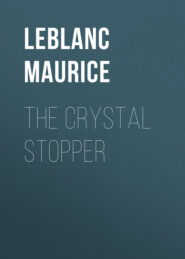По всем вопросам обращайтесь на: info@litportal.ru
(©) 2003-2025.
✖
The Extraordinary Adventures of Arsene Lupin, Gentleman-Burglar
Настройки чтения
Размер шрифта
Высота строк
Поля
“I am proud of it.”
“I have always said: Ganimard is our best detective. He is almost,—you see how candid I am!—he is almost as clever as Sherlock Holmes. But I am sorry that I cannot offer you anything better than this hard stool. And no refreshments! Not even a glass of beer! Of course, you will excuse me, as I am here only temporarily.”
Ganimard smiled, and accepted the proffered seat. Then the prisoner continued:
“Mon Dieu, how pleased I am to see the face of an honest man. I am so tired of those devils of spies who come here ten times a day to ransack my pockets and my cell to satisfy themselves that I am not preparing to escape. The government is very solicitous on my account.”
“It is quite right.”
“Why so? I should be quite contented if they would allow me to live in my own quiet way.”
“On other people’s money.”
“Quite so. That would be so simple. But here, I am joking, and you are, no doubt, in a hurry. So let us come to business, Ganimard. To what do I owe the honor of this visit?
“The Cahorn affair,” declared Ganimard, frankly.
“Ah! Wait, one moment. You see I have had so many affairs! First, let me fix in my mind the circumstances of this particular case....Ah! yes, now I have it. The Cahorn affair, Malaquis castle, Seine-Inférieure....Two Rubens, a Watteau, and a few trifling articles.”
“Trifling!”
“Oh! ma foi, all that is of slight importance. But it suffices to know that the affair interests you. How can I serve you, Ganimard?”
“Must I explain to you what steps the authorities have taken in the matter?”
“Not at all. I have read the newspapers and I will frankly state that you have made very little progress.”
“And that is the reason I have come to see you.”
“I am entirely at your service.”
“In the first place, the Cahorn affair was managed by you?”
“From A to Z.”
“The letter of warning? the telegram?”
“All mine. I ought to have the receipts somewhere.”
Arsène opened the drawer of a small table of plain white wood which, with the bed and stool, constituted all the furniture in his cell, and took therefrom two scraps of paper which he handed to Ganimard.
“Ah!” exclaimed the detective, in surprise, “I though you were closely guarded and searched, and I find that you read the newspapers and collect postal receipts.”
“Bah! these people are so stupid! They open the lining of my vest, they examine the soles of my shoes, they sound the walls of my cell, but they never imagine that Arsène Lupin would be foolish enough to choose such a simple hiding place.”
Ganimard laughed, as he said:
“What a droll fellow you are! Really, you bewilder me. But, come now, tell me about the Cahorn affair.”
“Oh! oh! not quite so fast! You would rob me of all my secrets; expose all my little tricks. That is a very serious matter.”
“Was I wrong to count on your complaisance?”
“No, Ganimard, and since you insist–”
Arsène Lupin paced his cell two or three times, then, stopping before Ganimard, he asked:
“What do you think of my letter to the baron?”
“I think you were amusing yourself by playing to the gallery.”
“Ah! playing to the gallery! Come, Ganimard, I thought you knew me better. Do I, Arsène Lupin, ever waste my time on such puerilities? Would I have written that letter if I could have robbed the baron without writing to him? I want you to understand that the letter was indispensable; it was the motor that set the whole machine in motion. Now, let us discuss together a scheme for the robbery of the Malaquis castle. Are you willing?”
“Yes, proceed.”
“Well, let us suppose a castle carefully closed and barricaded like that of the Baron Cahorn. Am I to abandon my scheme and renounce the treasures that I covet, upon the pretext that the castle which holds them is inaccessible?”
“Evidently not.”
“Should I make an assault upon the castle at the head of a band of adventurers as they did in ancient times?”
“That would be foolish.”
“Can I gain admittance by stealth or cunning?”
“Impossible.”
“Then there is only one way open to me. I must have the owner of the castle invite me to it.”
“That is surely an original method.”
“And how easy! Let us suppose that one day the owner receives a letter warning him that a notorious burglar known as Arsène Lupin is plotting to rob him. What will he do?”
“Send a letter to the Procureur.”
“Who will laugh at him, *because the said Arsène Lupin is actually in prison.* Then, in his anxiety and fear, the simple man will ask the assistance of the first-comer, will he not?”
“Very likely.”
“And if he happens to read in a country newspaper that a celebrated detective is spending his vacation in a neighboring town–”
“He will seek that detective.”
“Of course. But, on the other hand, let us presume that, having foreseen that state of affairs, the said Arsène Lupin has requested one of his friends to visit Caudebec, make the acquaintance of the editor of the `Réveil,’ a newspaper to which the baron is a subscriber, and let said editor understand that such person is the celebrated detective—then, what will happen?”
“The editor will announce in the `Réveil’ the presence in Caudebec of said detective.”
“Exactly; and one of two things will happen: either the fish—I mean Cahorn—will not bite, and nothing will happen; or, what is more likely, he will run and greedily swallow the bait. Thus, behold my Baron Cahorn imploring the assistance of one of my friends against me.”











